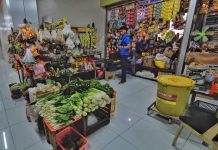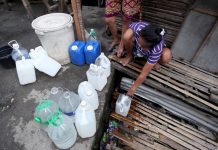The World Bank on Tuesday said the Philippine economy is expected to continue to post strong growth but fully implementing key reforms to boost investments is crucial to sustain growth.
“We anticipate that the Philippine economy will continue to exhibit strong performance in the next few years,” World Bank country director for Brunei, Malaysia, the Philippines and Thailand Ndiame Diop said in briefing for the presentation of the Philippines Economic Update (PEU) December 2023 edition.
“This growth will be propelled by a healthy labor market and declining inflation, which will stimulate robust household consumption,” he said.
For this year, the World Bank expects the Philippine economy to grow by 5.6 percent and edge up to 5.8 percent in 2024.
The services sector is anticipated to be the main growth driver supported by the ongoing recovery of the tourism sector and the consistent performance of the information technology and business process outsourcing industry.
“We expect that the full implementation of several investment reforms will enhance the country’s competitiveness to attract foreign investment, strengthening the country’s global growth prospects,” said Diop.
The Philippine economy grew by 5.9 percent in the third quarter of the year, bringing the year-to-date economic expansion to 5.5 percent.
“Despite the challenging global environment that resulted in a slowdown for many countries in the region, the Philippines stands out as among the top performers,” Diop added.
He said this can be attributed to the country’s resilient domestic demand which helped mitigate the impact of external headwinds.
Inflation, meanwhile, is forecast to settle at 5.9 percent this year and ease to 3.6 percent in 2024.
Policy recommendations
Diop pointed out that moving forward, full implementation of key forms is needed to mitigate the impact of high inflation amid volatility in global commodity prices and high cost of borrowings to stimulate private investment, promote job creation and reduce poverty.
These include the amendments to the Public Services Act, Retail Trade Liberalization Act, the Foreign Investment Act and amendments to the implementing rules and regulations of the Renewable Energy Act allowing foreign ownership of renewable energy projects.
World Bank senior economist Ralph Van Doorn said that in the short term, domestic policy priorities include containing elevated inflation and providing assistance to vulnerable sectors.
Van Doorn said enhancing forecasting and planning to help stabilize food prices, reducing market volatility and ensuring a consistent and reliable food supply remains fundamental to reducing inflation in the short term.
“In the long term, more effective public spending in agriculture could boost productivity and improve local food supply, thereby reducing the impact of food price shocks that disproportionately affect the poor,” he said.
“The flagship 4Ps cash transfer program, the digital food stamp program to ‘food poor’ families, cash subsidies to farmers, and fuel subsidies to public utility vehicle operators remain important tools to protect the incomes of poor and vulnerable Filipinos,” he added, referring to the government’s Pantawid Pamilyang Pilipino Program.
Aside from these, Van Doorn cited the importance of sustaining efforts toward fiscal consolidation which involves reducing fiscal deficits and improving revenue intake.
He added effective implementation of pro-investment reforms in renewable energy, trade, transport and telecommunications would generate economy-wide productivity gains.
Van Doorn said undertaking reforms to increase access and enhance the resilience of water supply and sanitation, education and health care systems can also enhance potential growth. (PNA)






